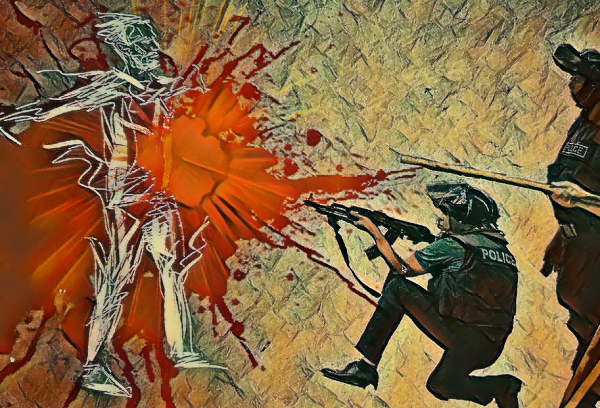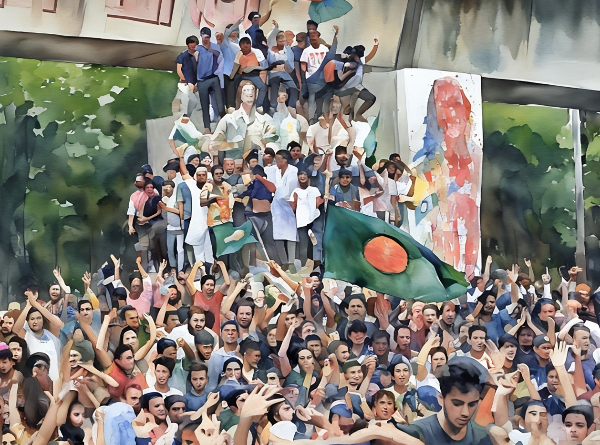July Revolution: The unmasking of the snowflakes
-66e3094fa070a.png)
"Listen up, everyone,” I used to tell my students, “The term 'homo sapiens' derives from the Latin word sapientia, meaning 'wisdom.' Our intellect is what sets us apart from other species, including other human species like Homo Deus and Neanderthals, as documented by evolutionary biologists. Do you understand?"
A few nods of agreement confirm that my insightful self can guide my Gen-Z followers toward enlightenment.
"Now, do you know the average attention span of a human today?" I ask.
I receive a mix of responses and some murmuring.
"Hold on a moment," I say, bringing order to the room. I then reference a Microsoft report that states the average human attention span is now shorter than that of a goldfish. I urge everyone to reflect: "Consider this—our constant need for dopamine-driven gratification is eroding our intellectual capacity. We need to control these selfish impulses for instant rewards. Civilization progresses through the collective well-being, not through individual desires."
For years, I've relished using this topic to kick off my undergraduate marketing communications classes. It felt good to be the voice of reason, the millennial sage poking fun at the self-absorbed Gen-Z. "Grow up, kids!" I'd say, half-joking, half-serious.
Then July 2024 hit Bangladesh like a thunderbolt.
Suddenly, those "snowflakes" were flooding the streets of Dhaka, Chittagong, Sylhet. They wore the national flag like a battle standard, makeshift weapons in hand, facing down police lines. Their chants echoed through the concrete canyons: "Tumi ke? Ami ke? Razakar, Razakar!"
It was a gut-punch. My smartphone screen showed the defiant faces of those self-obsessed twenty-somethings, and I was shaken. When the Prime Minister herself labeled them with the 'R' word for simply demanding reform, the protests exploded.
My comfortable worldview shattered. I was forced to confront the reality that these young people, dismissed as self-centered and entitled, were willing to risk everything for their beliefs. It was a humbling moment, a reminder that even the most cynical among us can be proven wrong.

What followed was the most brutal
state-led massacre in the history of independent Bangladesh. Even a month after
the fall of the despised tyrant, the extent of her cruelty continues to be
revealed. For me, however, it was a dramatic revelation of the power of the
people, led by youths who had been widely dismissed as overly sensitive and
fragile.
Can you recall a recent instance where thousands of schoolchildren, in their uniforms, took to the major city streets on a public holiday amid monsoon rains, chanting “we want justice”? The scene was so profoundly moving that, despite my lack of poetic skill, I felt compelled to capture the essence of the moment:
In his blood lies gunpowder, in his voice the quest for freedom!
What audacious courage! What an impossible rebellion!
Who knew that even raindrops could ignite flames?
Mugdho’s “pani lagbe pani?” (“Do you need
water? Water?”) still lingers in my mind. His bright smile in the Googled image
has an almost paralyzing effect on me. I can’t shake the image of Ashabul Yamin
from my thoughts.
How could they treat his lifeless body with such disdain? Even weeks after the incident, a helpless anger overwhelms my rationality. I recognize that this isn’t productive, but I can’t seem to escape it.
I know people like these and I deal with people like these—they’re the ones who make eye contact with me in my undergraduate classes.
How can I address them with a clear conscience? Yes, I stood with colleagues on our campus, calling for an end to police brutality and indiscriminate arrests. But isn’t that just a form of despicable virtue signaling when we were powerless to protect them from violence?
My firm sense of self-respect falters in light of a student’s harrowing account of torture in police custody. Never before in my career had I faced such poor judgment that a student could question my stance from a moral high ground.

I always prided myself on my ability to
guide them with conviction, but this experience has shaken that confidence.
But guide who now?
Those who stood face to face with the evil and glaringly declared- ‘not anymore’?
Those who stood tall against an army of trained killers and unflinchingly chanted- ‘the tyrant must go’?
I sense a real struggle to gather my confidence as I prepare to resume classes.
A month after the uprising in Bangladesh, I can't shake Abu Sayeed from my thoughts. His defiant stance against the guns pointed at him has become the emblematic image of the July 2024 uprising.
For me, this image signifies a generational shift from "snowflake" to "defiant." Our dismissive view of Gen-Z must reconcile with the reality that every generation has its own battles, struggles, and historical significance.
Historically, those generations that demonstrated character, shaped by their struggles for justice, are the ones remembered.
In the crucible of July 2024, we witnessed the emergence of that character in the youth of Bangladesh. They stood tall against oppression, their courage a beacon of hope in a dark time. We can no longer dismiss them as fragile or entitled. They have proven themselves worthy of our respect and admiration.
July 2024 was a month that felt like a decade’s worth of change.
—-
Omar Nasif Abdullah is a Senior Lecturer of the Department of Marketing & International Business at the School of Business & Economics in North South University.

